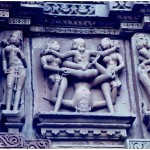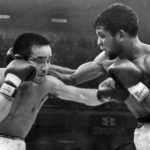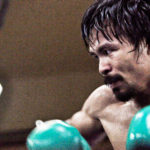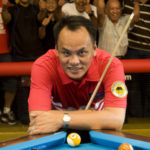The Life Of A Prizefighter
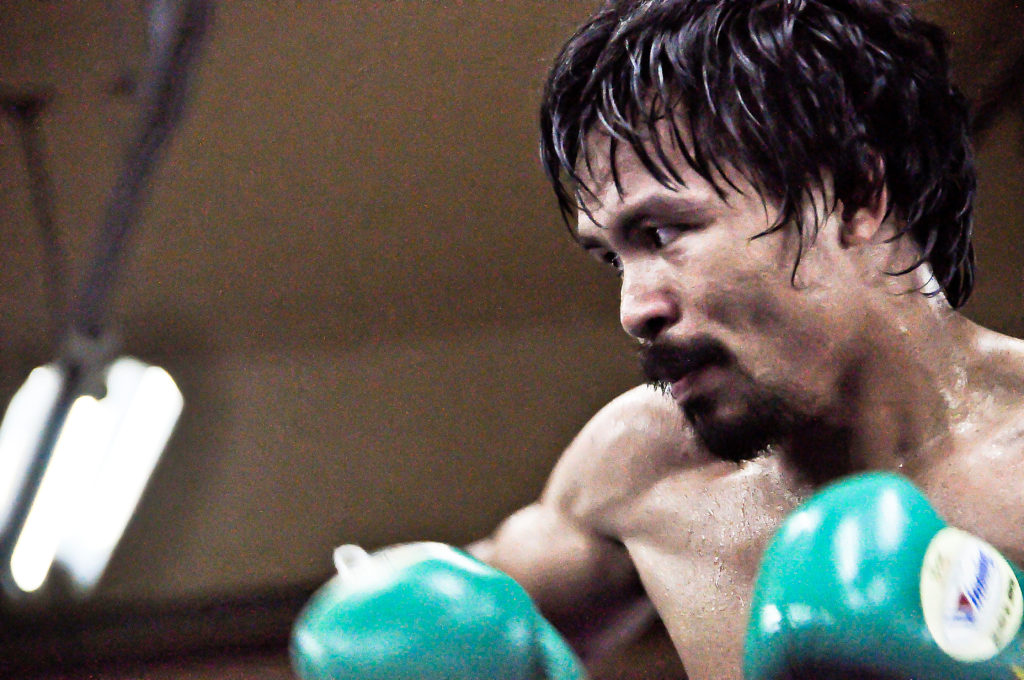
*This article originally appeared in the Asian Wall St. Journal and is re-posted here for portfolio purposes only.
By Ted Lerner
(General Santos City, Philippines)—Down a narrow, muddy lane that cuts through a poor village near the center of General Santos City in the southern Philippines, former boxer Rolando Navarrete plows through his daily routine. Broke and living alone in a house made of concrete breeze blocks, the former junior lightweight champion of the world—who once was this country’s most popular athlete—stands on the dirt floor, shirtless and wearing boxing trunks and rubber slippers, and relentlessly pounds his calloused fists into a taped-up and worn heavy bag.
Mr. Navarrete hasn’t fought since retiring in 1991, but for up to seven hours a day he attacks the bag with the purpose of a man much younger, someone who’s preparing for an imminent ring war. His hard, crisp punches and toned muscles indicate he could fight tomorrow, but clearly, at 53 years old, Mr. Navarrete is long past his fighting days.
“I want to prove that I am a good fighter,” Mr. Navarrete says in slightly slurred speech when asked why he tortures himself daily. “I want to come back if I have a chance, maybe an exhibition. I want to fulfill my dream of finishing this building. I need to concentrate, to focus.” If he can get some money from an exhibition, he says, he can turn his ramshackle home into a boxing gym and boarding house.
Mr. Navarrete is, in many ways, the embodiment of that unfortunate boxing cliché: Kid from gut-bucket poverty punches his way to fame and fortune, only to give it all away and end up destitute again. Today, the former champ walks with a limp, his right eye is cross-eyed and his speech is somewhat unintelligible.
He spent four years in prison—he was convicted of rape in Hawaii in 1984—and lost all his winnings. Yet his fall from near the top of the boxing world is even more jarring when juxtaposed with the fact that another native of General Santos is currently boxing’s biggest star.
While Mr. Navarrete squandered his success in every way possible, Manny Pacquiao is riding the heights of sporting superstardom.
Mr. Pacquiao lives in a palatial estate just four kilometers from Mr. Navarrete’s home, but his fame now stretches across the globe—an appearance on the U.S. television show Jimmy Kimmel Live earlier this month, in which he and comedian Will Ferrell sang a duet version of “Imagine,” is already a YouTube smash, and his fights are a draw for major-league celebrities such as actor Jeremy Piven and hip-hop stars Sean “P. Diddy” Combs and Jay-Z, who referenced the boxer in one of his recent hits.
And while Mr. Navarrete relies on handouts just to survive, Mr. Pacquiao is already one of the highest-earning sportsmen in the world. When he steps into the ring in Dallas this Saturday for a fight with Mexico’s Antonio Margarito, he’ll collect upwards of $20 million.
Seven hundred kilometers to the north of General Santos, in the mountain city of Baguio, the man who has won seven titles in seven different weight divisions was preparing to win his eighth.
As his trainer Freddie Roach held up two green mitts, Mr. Pacquiao snapped thunderous combinations, all the while darting in and out, moving side to side with lightning quickness.
It is this unique speed and power, coupled with a fearlessness and a willingness to always fight the best possible opponents at various weights, that together have electrified audiences world-wide.
Mr. Pacquiao is currently on a 12-fight winning streak in four different weight classes, battering superstars like Oscar de La Hoya of the U.S., Puerto Rico’s Miguel Cotto, Britain’s Ricky Hatton, and Mexico’s Erik Morales and Juan Manuel Marquez. If a proposed bout with American Floyd Mayweather Jr. comes together in 2011, it is expected to be the richest fight in the history of the sport.
Outside the ring, Mr. Pacquiao’s life has been a similar thrill ride. He spent his early years hustling on the streets of General Santos to help his single mother feed the brood, and first became popular as a boxer in the Philippines in the mid 1990s. The young fighter took every opportunity that came his way, from acting in movies and television comedies to appearing in dozens of commercials for everything from fried chicken to dandruff shampoo to karaoke machines. Whether he’s making speeches, handing out cash to the poor, or just playing pool and poker into the early hours, Mr. Pacquiao is seemingly everywhere at once.
Along the way, Mr. Pacquiao has amassed a fortune—he was the sixth-highest-earning athlete in the world last year, with earnings of $40 million, according to Sports Illustrated—and he shows a willingness to spend it. He keeps a paid staff of nearly 200 people to attend to his various domestic and business interests, according to his advisers. He has snapped up residential and commercial properties in his hometown, Metro Manila, and other places in the Philippines. This past May, Mr. Pacquiao fulfilled a long-cherished dream and won a seat in the Philippine House of Representatives.
The weeks leading up to Mr. Pacquiao’s fights are often marked by questions in the Philippine media about whether all the distractions of his life outside boxing will take their toll. Those closest to Mr. Pacquiao, however, say it’s all part of his makeup.
“I think he generates his own chaos,” says Michael Koncz, a Canadian who serves as Mr. Pacquiao’s closest adviser. “I honestly believe that without some kind of chaos, he can’t function properly.”
Mr. Roach says that Mr. Pacquiao wasn’t as focused as he’s been in previous camps, but says, “We have to have some disruption during training camp. It’s what makes us tick. He’s a multi-tasker and that’s his style.”
The soft-spoken Mr. Pacquiao insists he can handle his various duties and interests.
“Yes I have more responsibility than I had before,” he says. “My life now is more busier than before. Especially with Congress. But I can handle everything because I have good time management.”
Mr. Pacquiao has already begun investing part of his earnings in places where he can’t touch it just yet, and he’s started to trim some of the fat from his team, said his adviser, Mr. Koncz.
“Because of his kindness and generosity,” Mr. Koncz says, “there’s a lot of wasteful spending because there’s a fine line between being generous and kind and people taking advantage of you. Sometimes it’s hard to explain to Manny that those people have gone over that line and are now taking advantage of you. He’s getting smarter on that, too.”
Perhaps Mr. Pacquiao’s biggest challenges will come when he finally decides to hang up the gloves, which he has said he will do after three or four more fights.
“If Manny’s no longer fighting, the funds are going to be limited,” says Nick Giongco, a boxing writer for the Manila Bulletin who has covered Mr. Pacquiao since the early days. “Of course he would dig into his pocket to make sure his people get paid. The question is, Up until when will he do that?”
Then there’s the psychological trauma that often afflicts boxers when the cheers are no longer present. “It is tough to live a life after boxing,” says Mr. Roach, the trainer. “It’s very difficult. I suffered that in a much smaller way. I didn’t achieve what he (Pacquiao) did. I’ve seen world champions, like Sugar Ray Leonard, people don’t recognize you as much anymore. It’s a little sad and can be tough.”
Fans, however, can perhaps take solace in the fact that since the beginning of his career, Mr. Pacquiao has lived and danced on the public high wire and always come out on top.
When asked about Mr. Navarrete, Mr. Pacquiao turns philosophical. “First, Navarrete didn’t make that much money in his day,” he says. “He fought one defense and he lost.” Also, Mr. Pacquiao says, Mr. Navarrete fell in with some bad influences and got distracted by the party lifestyle. “That’s what I’m explaining to all the boxers—that when they achieve their dreams they have to balance,” he adds. “With great power comes responsibility. You can’t have one without the other.”
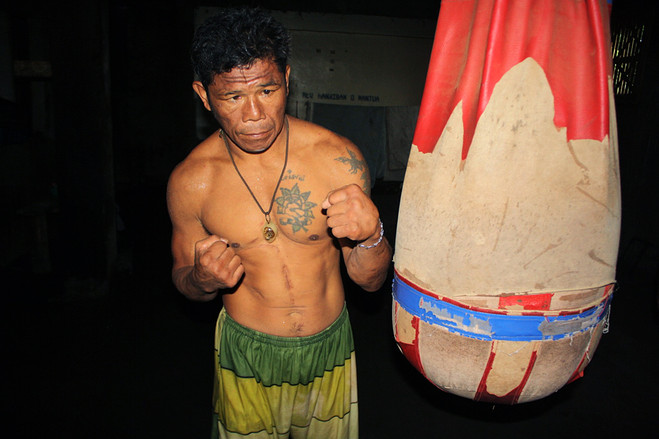
Former World Champion Rolando Navarrete, now in his 50’s and destitute, still pounds the heavy bag daily in hopes of one last shot at glory.
In General Santos, Mr. Navarrete is sitting on an old wooden bench, next to a rickety wooden table in what serves as his living room, as he tells with unflinching candor how he went from the bottom to the top of the world and back to the very bottom. On the wall above where he sits hang some of the last remnants of his glory years—several faded pictures, including one of the 24-year-old champion visiting then-President Ferdinand Marcos.
Like Mr. Pacquiao, Mr. Navarrete grew up dirt-poor on the streets of General Santos. One of 11 children, he turned to boxing at the age of 16 to escape his family’s predicament. He was the kind of fun-loving kid who, after a fight, would share a bottle of liquor and cigarettes with friends and fans at a street-corner canteen.
Mr. Navarrete always had a short fuse that would often lead to scraps on the streets. Fans affectionately labeled him, “The Bad Boy of Dadiangas” (the former name of General Santos City). These days, he’s also sometimes referred to as “the original Pacquiao.”
Mr. Navarrete’s star was at its his highest in 1981. He had already progressed through the national and Asian ranks and, that year, he was asked to be a last minute fill-in for a title fight in Italy. Mr. Navarrete took the fight and knocked out Ugandan Cornelius Boza Edwards in five rounds for the world title.
Eight months after winning the title, though, he lost it in just his second fight as champion. “When I won the world title, I felt like a king,” Mr. Navarrete says. “I cried because I’m so happy. But when you lose, you feel that nobody loves you.”
He continued fighting and chalked up some victories, but his love of the good life soon became his downfall. “I have problems with girls and drinking. But I’m not a trouble maker. I’m a good man,” he says.
His wife left soon after he lost the title, and he says a former manager in Hawaii never paid him the $150,000 he was owed from a fight. In 1984 came the rape conviction; he still denies any wrongdoing. In 1998, he nearly died from a stab wound in the neck, which he suffered in an argument over a stolen necklace.
These days, Mr. Navarrete relies on the support of others and a Philippine people that doesn’t easily forget its heroes. Every two weeks, he visits city hall and collects $60 from the mayor’s office. He attends every small fight card in the area, where some local official who remembers the glory days will slip him a few notes. And every so often he runs into Mr. Pacquiao, who always hands the former champ some cash.
“To ask Manny Pacquiao for money, it’s embarrassing,” Mr. Navarrete says. He harbors no envy and is happy for Mr. Pacquiao, he says. “Manny Pacquiao is smart. He’s a good man. He cares about his money. He’s not greedy. He trains hard. He’s got a gift from God.” Asked what Mr. Pacquiao said to him the last time the two met, Mr. Navarrete says, “He told me, ‘Go to church two times a month.'”
As Mr. Pacquiao was preparing to dart off to the U.S. to wow his growing legion of fans once again, Mr. Navarrete headed to General Santos’ famous fish port, where young men haul in giant tuna and other fish big and small. Several days a week he comes to the bustling docks, where he borrows money to buy small amounts of fish that he sells on or takes home to eat.
As Mr. Navarrete shuffles through the throng, somebody calls out, “Idol,” or “Hey, Champ!” Others turn their heads, smile and crack a joke. A vendor tops off his plastic bag with more free fish.
Despite the lingering bitterness of a life gone awry, and the longing for one last bit of boxing glory that will never come, Mr. Navarrete can still smile. He gets by. His stomach is full. And his countrymen still love him for his legendary ring exploits. “Even though I have a lot of bad luck in my life,” he says, “I’m lucky. I’m still alive.”
Ted Lerner is a freelance journalist and author of the timeless classic book, Hey, Joe—A Slice of the City, an American in Manila, as well as a book of Asian travel essays, The Traveler and the Gate Checkers–Sex, Death, Life, On The Road In Asia. Both books are available on Amazon.



